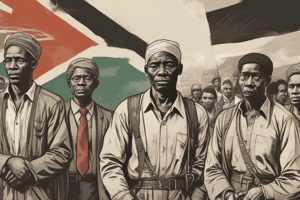Podcast
Questions and Answers
What was the significance of the April 1994 elections in South Africa?
What was the significance of the April 1994 elections in South Africa?
- They represented the first non-racial elections, a culmination of the dismantling of apartheid. (correct)
- They led to increased racial segregation and discrimination.
- They marked the beginning of formal apartheid legislation.
- They signified the end of European colonization in South Africa.
The dismantling of apartheid in South Africa was completed immediately after the formal abolition of apartheid legislation in 1991.
The dismantling of apartheid in South Africa was completed immediately after the formal abolition of apartheid legislation in 1991.
False (B)
Define 'apartheid' and state the period during which it was enforced in South Africa.
Define 'apartheid' and state the period during which it was enforced in South Africa.
Apartheid was a system of racial segregation and discrimination enforced in South Africa from 1948 to 1994.
The origins of racism and apartheid in South Africa can be traced back to the beginning of large-scale ______ colonization.
The origins of racism and apartheid in South Africa can be traced back to the beginning of large-scale ______ colonization.
Which of the following best describes the role of cooperation among various actors in South Africa's transition to non-racial democracy?
Which of the following best describes the role of cooperation among various actors in South Africa's transition to non-racial democracy?
Racism solely exists as a personal belief and does not manifest in systemic policies or practices.
Racism solely exists as a personal belief and does not manifest in systemic policies or practices.
Name three systematic policies through which racism in South Africa manifested itself.
Name three systematic policies through which racism in South Africa manifested itself.
Apartheid, which means "separateness" in the ______ language, was a system of racial segregation and discrimination.
Apartheid, which means "separateness" in the ______ language, was a system of racial segregation and discrimination.
Match the following events with their description in South Africa's history:
Match the following events with their description in South Africa's history:
What is the main idea of the provided content regarding racism and apartheid in South Africa?
What is the main idea of the provided content regarding racism and apartheid in South Africa?
According to the provided content, the legacy of racism in South Africa has been completely eradicated.
According to the provided content, the legacy of racism in South Africa has been completely eradicated.
Explain how European colonization contributed to the establishment of apartheid in South Africa.
Explain how European colonization contributed to the establishment of apartheid in South Africa.
Racism in South Africa was characterized by the ______ distribution of resources, especially during apartheid.
Racism in South Africa was characterized by the ______ distribution of resources, especially during apartheid.
Why was the cooperation of various actors important in South Africa’s transition to a non-racial democracy?
Why was the cooperation of various actors important in South Africa’s transition to a non-racial democracy?
The term 'apartheid' translates to equality in Afrikaans.
The term 'apartheid' translates to equality in Afrikaans.
Describe how forced removals impacted South African society under the apartheid regime.
Describe how forced removals impacted South African society under the apartheid regime.
Apartheid laws in South Africa prohibited ______ relationships, reinforcing racial segregation.
Apartheid laws in South Africa prohibited ______ relationships, reinforcing racial segregation.
Match each term with the correct description:
Match each term with the correct description:
Which historical period primarily explains the origins of resource inequality in South Africa?
Which historical period primarily explains the origins of resource inequality in South Africa?
The end of apartheid laws automatically resulted in the end of all forms of racism in South Africa.
The end of apartheid laws automatically resulted in the end of all forms of racism in South Africa.
Flashcards
What was Apartheid?
What was Apartheid?
A system of racial segregation and discrimination enforced in South Africa from 1948 to 1994.
Dismantling of Apartheid
Dismantling of Apartheid
Took place over several years, ending with non-racial elections in April 1994 after apartheid legislation was abolished in 1991.
Racism
Racism
The belief that one group of people is superior to another.
Apartheid's Origin
Apartheid's Origin
Signup and view all the flashcards
Racism's Manifestations
Racism's Manifestations
Signup and view all the flashcards
Apartheid Policies
Apartheid Policies
Signup and view all the flashcards
Study Notes
- Apartheid's dismantling in South Africa spanned several years, concluding with the first non-racial elections in April 1994.
- The formal abolition of apartheid laws occurred in 1991.
- The transition to a non-racial democracy required collaboration from various entities, including the government.
- Racism is rooted in the belief of one group's superiority over another.
- Apartheid, meaning "apartness" in Afrikaans, was a system of racial segregation and discrimination in South Africa from 1948 to 1994.
- Racism in South Africa began with European colonization, leading to the implementation of apartheid (1948-1994).
- Apartheid involved legally enforced racial segregation and discrimination.
- Racism in South Africa included forced displacement, segregation, and unequal resource distribution, particularly during apartheid.
- Consequences of racism persist in South Africa.
- Racism was evident during apartheid through laws prohibiting interracial relationships and categorizing citizens by race.
Studying That Suits You
Use AI to generate personalized quizzes and flashcards to suit your learning preferences.



